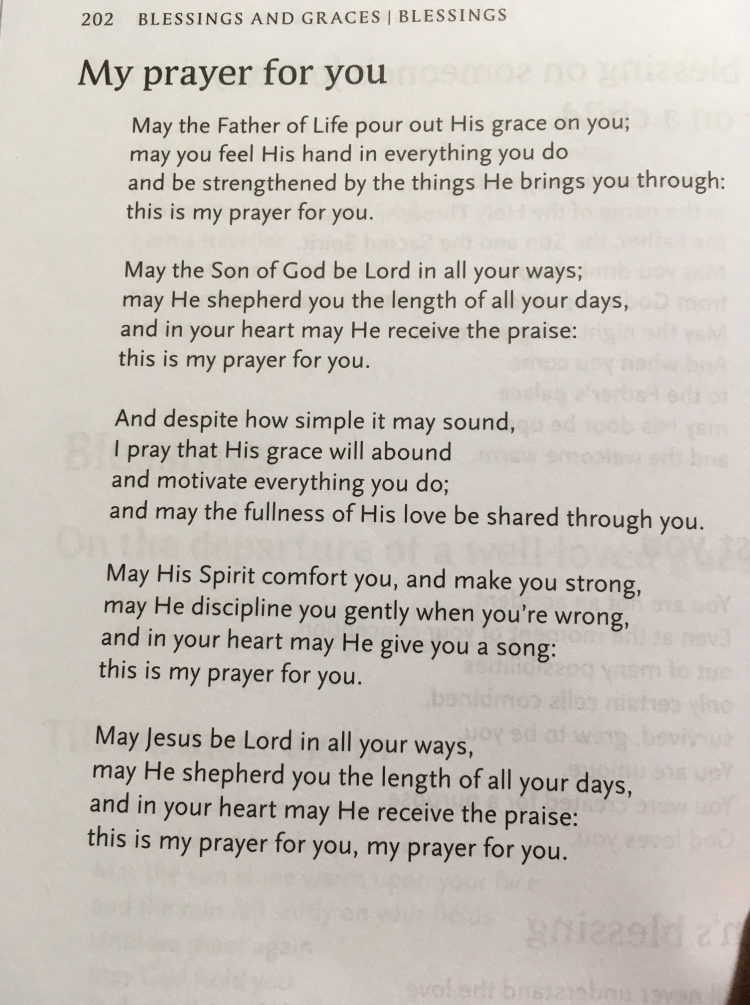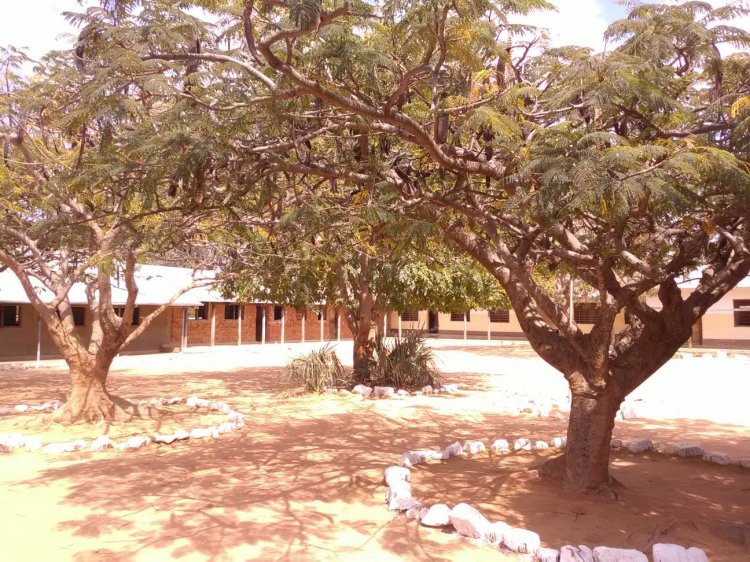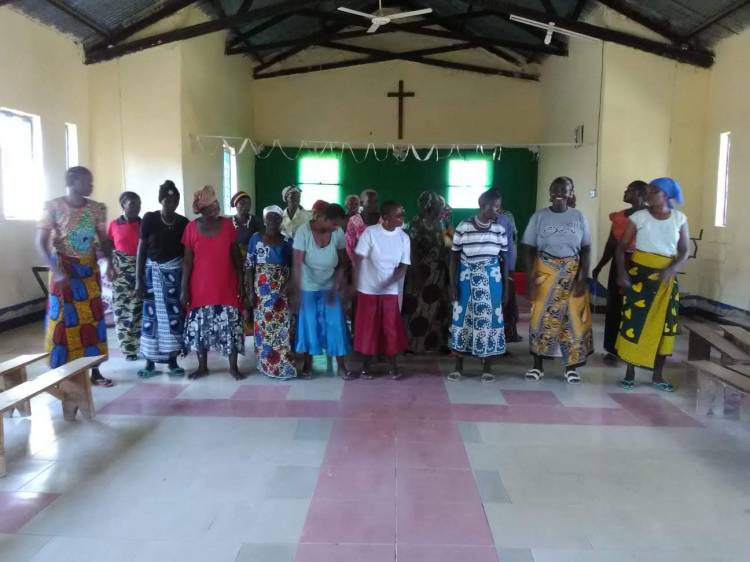It is unusual for us to write two posts so close together but this one is a little bit of a cheat…
First we want to share with you the blessing that was prayed over us by Rev Richard Preistley at Oakhill Somerset while we were in the UK earlier this year.

We also wanted to share a thoughtful report from Julie Fagan on her time with us in Tanzania….
Kilimatinde, Tanzania – hope in one of the poorest, driest regions of Tanzania.
Phew I’d made it – Dar es Salaam, meaning haven/house of peace, and capital of Tanzania, my destination before the next part of my journey to Kilimatinde in the centre of the country. Grace and Festo Kanungha, Church Mission Society partners and friends of Jeremy, one of my son’s, had kindly offered me accommodation so that I could see their work at St John’s Seminary and report back to my other son Jonathan. Jonathan gives 10% of his company’s profits to charity, and had sponsored some pupils at the school. (See Festo and Grace Kanungha and Grace’s blog to hear their story https://festoandgrace.wordpress.com )
After getting through immigration in the airport, not an easy process, I was met by Grace who had already been to the airport once in the early hours to meet two German gap year students. Dollars were changed into thousands of Tanzanian shillings. We had a tasty meal at a wayside café and a night in an economy hotel before an early call next morning to catch the coach at 7 am. All so new – vendors with fresh bananas, roasted sweetcorn, packets of peanuts, lots of tomatoes, all carefully balanced on trays and offered to all and sundry. The ground surface was sandy with stones and rocks that might trip up the unwary. There were wooden stalls and shacks round the edges of the coach station and lots of vehicles heading off.
August is in the long dry dusty season, with cool mornings and evenings and warm weather during the day, sunrise and sunset being around 7 am and 7 pm.
The coach journey of 549 km/341 miles took about 11 hours, with two toilet stops, (ceramic floor loos that flushed, with hot water and soap provided for careful handwashing. Very good for checking mobility but how would older women manage?)
Take care not to be left behind by the coach – the conductor doesn’t check who gets on and off. There were food stalls selling chapattis, bananas, large tomatoes, onions, drinks and snacks whilst others were cooking food such as plantains, meat, eggs and chips. Some passengers brought lunch back on to the coach. We had brought snacks to keep us going.
We travelled through scrubland, fields of sisal, sweetcorn and vegetables, ranges of hills, conservation areas, passed small shoebox shaped houses made with mud bricks, susceptible to collapse in the heavy rains, houses made from more substantial cement bricks, crowned with tin roofs, women with heavy bundles on their heads.
It was only in the last decade that main roads were properly surfaced even though they are the main means of transport. We passed large petrol stations, many lorries including broken down ones at the roadside too. The coach driver weaved in and out of the traffic, so close to vehicles at times that it seemed only a whisker separated us from the vehicle in front. There is a rail system but the trains are very slow and unpredictable; that is why the track is unfenced and people walk along it.
Finally we arrived at the bus stop in Solya and the school bus driver David collected us and our luggage and took us to our accommodation, built in the last year, thanks to peoples’ gifts. Stephen Hatch, another CMS mission partner, (maths teacher and head of science at the school, supporting Festo and the chaplain) took over from a very weary Grace, joyfully welcomed by her sons Zephaniah and William. Festo, Grace’s husband, was busy trying to sort a new Government registration process for the school.
A welcome meal Stephen had cooked for us, awaited us. (If you look at Stephen’s link letter in May this year https://churchmissionsociety.org/resources/stephen-hatch-link-letter-no5-may-2018 you will see the dining area, school chapel which doubles as the school hall and the Rock nearby with an awesome view over the Rift Valley).
Then Stephen introduced us to some of the quirks of the high roofed building which has mesh windows, to help keep it cool in the hot season. The only plumber around is not very able and the materials used are poor quality so that one of the underground pipes was broken by a cow walking above it. (The cows are not heavy sleek ones like ours by the way.) The pipe pathways now have rocks protecting them. The water from the kitchen goes straight outside and the wash basin I was using had a tap underneath to turn on and off because the tap above didn’t close. No hot water but there were cold water showers.
We were at the end of the water supply pumped up from the water tower in Solya village, which meant that there might not be any water at times when the students were washing or cleaning. We had a water container fitted with a filter so that we didn’t have to use bottled water. (It took me a couple of days to remember to use the filtered water not tap water, when cleaning my teeth. Oops!)There is no recycling system locally so all rubbish is burnt including plastic, a huge environmental issue in many countries.
Our beds were fitted with mosquito nets attached to frames so that they were not difficult to get under. I never saw a mosquito and the area there on the edge of the Rift Valley was low risk at that time of the year, though students did succumb to malaria in the rainy season and because they were sometimes poor about using their nets. Plenty had been provided by a charity.
Students speak their tribal language, also Swahili and then learn in English. I joined the Swahili lesson given by Grace to Joella and Sylvie the two German volunteers who had come for 10 months to help in the nursery. What a gift they are and what a challenge, learning Swahili and having to use English too.
That evening Grace and Festo had their games night, a special treat being chocolate cake made by Grace. We played card games and generally relaxed. Our party included 4 English medical students from the nearby mission hospital who had just completed their 4 weeks electives training.
A smiling Mama Fatuma came each day Monday to Friday with toddler Shadiya, cooking chapatti for our lunch and beans or meat and rice for our evening meal as well as generally cleaning in the kitchen and lounge. She has two children in school and she pays their fees with her work. She cooked delicious beans and rice that day over a charcoal fire on the veranda, a fire hazard for young Shadiya.
There were geckos on the walls and some insects that were rather large when they came indoors. The ants on the other hand were tiny. There were signs of termites about in the soil and around trees and although there were snakes in the area, we didn’t see any as they get out of the way if they feel vibrations in the ground. There was a leopard about at night sometimes, possibly two but Grace and Festo’s dogs scare them off. They came up from the Rift Valley Grace thought, also baboons though again, we didn’t see any. There were quite a few birds around in the trees.
Primary education for 7 to 13 year olds is provided by the Government but the amount paid doesn’t cover all the fees, uniforms, books and supplies and families struggle to pay their contributions. It also means that some of the children don’t go to school. Some of the families are so poor that the children become malnourished. The local hospital has a programme for identifying these children and providing special food for them.
Primary education is in Swahili but changes to English at secondary level . The other challenge is that secondary education has to be paid for. A lot of children finish their education at primary level either because their family can’t pay the fees or because their English and general educational attainment is not advanced enough and they fail the exam.
Over the next 6 days, I was shown round the school which now has about 250 students who are resident there. I attended the Christian Union year 4 graduation service, some school assemblies, and watched their morning parade common to all Tanzanian schools (attention, at ease, turn right, turn left, performed with smiles). Notices are given and punishments too.

A view of part of the school square
The nearby bible college for adults had their special start of term service on the Sunday afternoon when most of the school pupils attended too.
Stephen invited us to his evening preparation meeting for the student volunteers who take some of the morning assemblies. Studying the bible is a Government requirement with an examination set by the Government (the Quran for Moslem students) and the students’ bibles are well used. (They study Genesis and Exodus in Year 1, parts of Numbers and Deuteronomy plus Joshua and Judges in Year 2, Matthew and Luke in Year 3 and the Book of Acts in Year 4.)
We met in the Physics lab for the meeting which resembled a classroom from the early part of the last century. 19 young people came along. As an icebreaker, they named their favourite book of the bible. To my surprise, 10 chose books from the Old Testament, including Isaiah and Ezekiel.
I attended the Anglican service at Solya with Grace and Festo where Grace helped me introduce myself and give greetings in Swahili from our churches.
I visited the bible school nearby and spoke a little there to the students, having attended one many years earlier. It is a huge sacrifice for them (with only two women students amongst them) because of finding the fees and leaving their families for the three year course, returning home in between terms to catch up with growing their food on their pieces of land and on which their families rely. As the numbers attending grow, so the need for a new building grows too and the Principal showed me the foundations and the bricks waiting to be built. I think he hoped I would be able to help financially.
I visited the nursing and midwifery training school, and was shown round by the principal Mrs Laizer who has a Batchelor of Nursing degree and a Masters in nurse education. Students have to pay for their training, the majority of whom are male. I wrote in the visitor’s book that I had been very impressed and hoped and prayed that they would be allowed to upgrade to diploma level, a three year course that would enable the students to gain more clinical skills. The school also runs a one year community nursing course and staff go out to the community clinics to provide antenatal care, weigh the babies and give vaccinations.
The doctor who was in charge of the small hospital next door, Dr Uggi, showed me round the wards. He pointed to the ward where women and their families could come and stay at no cost, providing their own food, whilst the women waited to go into labour. Distances from some of the villages are lengthy and in the rainy season, the roads become impassable from some of the villages; coming ahead of time has saved many lives.
I saw the newly opened burns unit, necessary because of the open fires and accidents especially with children. The Kilimatinde Trust here in the UK (see https://www.kilimatindetrust.org.uk) had provided the funds. They are also researching provision of solar panels for cooking.
Families care for their relatives, cooking their food, washing and feeding them and providing their bedding. Maybe an answer for our cash strapped NHS? It was all very sparse.
Grace took us to meet the Bishop of the diocese of the Rift Valley at Manyoni. She fitted it in with visiting the bank, the immigration people who had made a mistake with Joella and Sylvie’s passes, and showed us the cathedral, as the Bishop was initially busy elsewhere. He had a fairly long conversation with us, a very pleasant man – as you’d hope I suppose! When asked about time keeping, he observed that people in the West are very punctual and very stressed. At the other extreme, Tanzanians could become very idle and poor. It needed a middle way he suggested.
Grace shopped round the market stalls for fresh meat and vegetables, much more enjoyable than supermarket shopping I thought.
In the afternoon I attended the Mothers Union meeting with Grace who translated for me, and I heard the song they were preparing for their annual conference of bible teaching for 4 days, meeting with lots of other MU groups and including a concert. The song is about the journey of the Israelites escaping from slavery in Egypt and travelling through the wilderness, on to our own life journeys that can be hard and how God carries us through. Their harmonies and drumming were beautiful to hear and they allowed me to video it. They were planning what food to take on their trip as they do their own cooking and take cooking pots and bedding too. Their families manage without them! It is a huge affair with 1000 – 1500 people attending, sleeping on church hall floors and the like.
Grace enjoys attending the local meetings and sharing fellowship with the members and was speaking about ‘Zumm’ on the Saturday at the conference. (Traditionally parents don’t speak much to their children so that by the age of three when they start nursery, their language development is limited. Zumm teaches them how to interact, and its benefits.)

Mothers Union Choir practising for upcoming concert.
On my last day, Grace asked me to gather some documents and take some photos for two grant applications to charities that provide tools (there is a vocational mechanics training course) and sewing machines (there is a vocational sewing course too). The courses provide practical skills and ways of earning an income for students and eventually people in the village too they hope, as well as goods for the Rift Valley Crafts, another source of income. (There are about 10 sewing machines that need repairing so if you know of anyone who could spare a few weeks to go there and train some people in how to repair them, that would be wonderful.)
Festo also supports the microfinance initiative introduced by Tearfund, that encourages people to save small amounts and start a small business like chicken rearing. People learn how to budget too.
That afternoon, Grace skilfully drove us and the children on a very bumpy track to the nearest dam where once a hippopotamus had lived. Zephaniah, William and Karen enjoyed playing at the water’s edge while I watched a bird dive straight into the water and emerge triumphant with fish in beak. Awesome.
What did I learn in this first part of my journeying?
I learnt that people worshipped God wholeheartedly, joyfully and thoughtfully. They always started meetings with songs of worship.
I learnt that Grace, Festo and Stephen live quite frugally and sacrificially to work there. They all need more regular funding for CMS to be able to pay them fully but even then, their standard of living would be basic.
That Zephaniah and William and their cousin Karen who lives with them at present, are able to wander around feely and help with the goats, pigs and hens (Festo is a farmer as well as headteacher) and attend nursery and primary school. However they don’t have the beautiful schools and equipment that our schools have, with more relaxed teaching methods, another sacrifice.
That God has provided funds all along the way for the building projects – people are prompted to give. At present they need funds to build accommodation for students so that they can start teaching A levels. Their other dream is for a primary school building for which they have the foundations.
That the team have a strong sense of calling to the work because of the love of God they have experienced personally and want to share with the children and young people.
For their commitment to good education so that these young people may flourish and have a future, to help them and their families out of poverty.
For their generosity with their time and care, to support volunteers and help them grow in every way, seen as a two way process.
It was very humbling to spend time with them and I am very grateful to them, to my family who helped me so much with my preparations, for all the people who remembered me in their prayers and to God for keeping me well and safe.
It was now time for me to return to Dar es Salaam on the 11 hour coach journey and fly to Ndola in Zambia via Addis Ababa for the last two weeks of my learning journey, this time through Tearfund.
wonderful insight into everything thank you – God Bless all you do – everyone of you – Liz Guest
Just got around to reading the last blog as recovering from an operation. So much to take in an pray for so thank you for all the news and beautiful photographs. Blessings to all for Peace and Joy this Christmas.